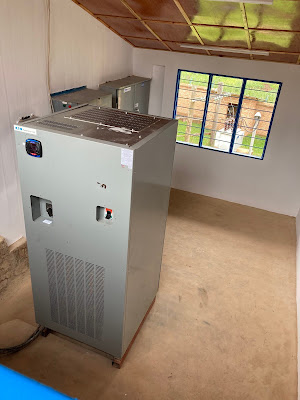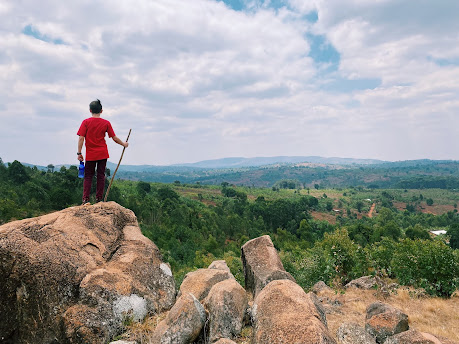29.10.21
The Things You Get Used To
25.10.21
Wisdom of the Egyptians (and Mike Mulligan)
(By Caleb)
The national electrical grid in Burundi has always given us some significant challenges both in terms of the quantity and the quality of the power delivered to our campus.
In 2018, ITEC came and installed solar panels, inverters, a new transformer, and a new generator which I wrote about here and shared a video about here. This was a HUGE game changer for both the quantity and quality of power for the hospital. But with some long rainy days affecting our solar and a national diesel shortage crippling our generator, we reluctantly resort to using the national grid to power the hospital through a lot of the night.
This opens us up to the ‘dirty power’ that puts much of our electrical equipment at risk. Especially the sensitive and expensive equipment in the lab, radiology, operating rooms, eye unit, and our growing IT service.
A while back I was talking to my good friend, Jason Kurien, who is an electrical engineer and he suggested an Eaton Power Conditioner which is a really sophisticated electronic transformer that can take in ‘dirty power,’ clean it up, and produce ‘clean power’. I had never heard of one, but this started us down the path to electrical bliss. Originally, we purchased 2 smaller units to protect our most sensitive equipment. And they performed wonderfully! We stopped losing expensive equipment every thunderstorm and this eased many headaches.
But our campus has grown significantly and we have outgrown these smaller units. So back in 2019, Jesh and Julie Thiessen raised funds to buy a large power conditioner to serve the whole hospital. This unit is about the size of a refrigerator and weighs 1,020kg or 2,250 lbs.
And it is fragile.
And very expensive.
 |
| Heavy, complex, fragile, expensive and vital to the hospital |
The time had come to install this wonderful piece of equipment. But we first needed to move it from our workshop to a hard-to-reach area where the power enters our campus about 150 meters (500ft) away over really rough terrain and down two 1-meter high ledges.
How was this going to happen with the tools and resources we have?
Originally it was my brother Jason’s idea to figure out a way to increase the number of hands we could get on it. And it was Desire, our master welder, who brought this idea to fruition. We ended up with a system that would hopefully allow 30 men to carry the power conditioner safely without injury to man or machine. With all the steel, the men would need to carry 35kg or 80 lbs. each.
 |
| Desire welding up the carrying contraption |
I envisioned that we would just take our time and move 10 or 15 feet at a go and then gently put it down and rest. It would have been totally fine if it took all day.
But once those 30 men started moving there was no stopping them! They even sang as they walked and their flip-flops where flying everywhere. They did end up putting it down one time en route, but that was only to get clarification on which direction it should face once they arrived at the concrete slab. It was a sight to behold. Here is a little video:
 |
| Arriving safely at the destination. Phew!! |
One of my favorite stories as a kid was Mike Mulligan and his Steam Shovel by Virginia Lee Burton. In summary, this old steam shovel dug the basement of new town hall so fast to the applause of the crowds that they forgot to leave a way for the shovel to get out. So they just built the building around it and it retired as the boiler heating the building and they lived happily ever after.
In a mildly similar vein, we had to get the power conditioner shoehorned into place before we could build the building around it:
 |
| Beginning to construct the power house around the new power conditioner. |
 |
| Power house complete. |
 |
| Our new power conditioner inside to stay...happily ever after. |
9.10.21
Kibugita
by Rachel
Recently, Eric and I received a special book in the mail entitled Big Knife (Kibugita). It's special because it's the autobiography of a man who has been very influential over many years at Kibuye, Dr. Frank Ogden. Our team has now been settled at Kibuye for eight years, which can seem like a long time but is really not much more than the blink of an eye in the grand scheme of things. When we showed up, there had not been a long term medical missionary presence in a number of years. To be clear, the hospital has run and cared for thousands of patients over the years with excellent Burundian staff and physicians, but without another western physician there, we didn't always have a good background as to how the hospital started, who started it, and the stories of comings and goings over the years. Whose house was that? How did this project get started?Of course, since our arrival, we've had the privilege of meeting and visiting with Frank and his wife Carol many times. Other visitors have come as well to fill in some pieces and regale us with special stories about who used to live in this or that house, when that tree got planted, the tales behind several gravestones. It struck me as I read through the biography that I don't think we've ever shared the story of Dr. Ogden on our blog. In fact, even though it was many years before we met him in person, Eric and I might never have gone to visit Burundi in 2010 had it not been for him. He recruited one of our friends to visit Kibuye in the mid-2000s, while our friend was still in his medical training, and when we put out a broad request for ideas for our future team, our friend contacted us and said, "Hey, have you ever heard of Kibuye?" So, for that and many other reasons, we'll always be thankful to Dr. Ogden!
It was enjoyable for me to read through the pages of his book because I could visualize almost all of his stories, from crazy surgical cases (including a ruptured uterus that happened 9 months prior to surgery) to crazy road trips (my favorite was the time he and his family drove 1000 miles from Burundi to Nairobi to pick up his brother, only to arrive and discover that his brother had actually flown in to Bujumbura and they had to drive all the way back!). He shared details of many different difficulties (such as multiple home robberies and the death of his first wife after colon cancer), and joys (surgical successes, preaching opportunities, and even an entire appendix on plane and helicopter flights). Dr. Ogden served on and off as a surgeon at Kibuye for over a 40 year time period, starting in the early 1970s. He earned the nickname of Kibugita (Big Knife) because of his surgical abilities and capacity to perform so many operations in a short period of time! Due to civil war and health difficulties, his time was divided between Kibuye, Kibogora (in Rwanda), and Nundu (DRC) hospitals, and also included some time practicing back in the Pacific Northwest. His book featured the stories of many of our friends and current hospital employees who have been faithful to the church and hospital over the years, and I appreciated hearing their histories and contributions as well.
So in many ways, it was great to read a book that shared so many stories and anecdotes from the early years of Kibuye Hospital. It all serves to remind us that our team is not starting a new work on our own. We are continuing a work that was begun many years ago and has been carried on the shoulders of many, many people (Burundians and westerners alike). We didn't begin the work at Kibuye and we probably won't end it, but we are just another chapter in a long story of how God has used a small rural hospital in a small African nation to care for the medical needs of so many.



